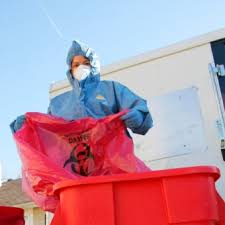How Improper Medical Waste Handling Affect Our Oceans
3/13/2020

Each year, 2 million tons of medical waste are produced in the United States alone. These medical waste can end up in our oceans and waters due to poor handling and segregation systems. Here are some hazards of mishandled medical waste to our oceans:
Effects on the Ocean Ecosystem
Medical Waste dumped on our waterways can negatively affect entire food chains in our oceans. Contaminants from medical waste, such as Mercury, can end up being absorbed by plants and small sea creatures, which in turn is eaten by fish and other bigger sea creatures.
This, in turn, will harm us, humans, when we eat seafood. That is why consuming Tuna meat daily is discouraged, as it can contain high amounts of Mercury. Most cases of mercury poisoning are linked to eating seafood.
This, in turn, will harm us, humans, when we eat seafood. That is why consuming Tuna meat daily is discouraged, as it can contain high amounts of Mercury. Most cases of mercury poisoning are linked to eating seafood.
Risk of Infections
Medical Waste finding its way into our waters can also lead to people visiting and swimming on the beaches contracting deadly infections and diseases. Diseases such as HIV and AIDS from contaminated needles and syringes. Bacterial infections from waste contaminated with blood, urine, and other bodily fluids.
Effects on the Economy
Local economies that depend on our beaches will be affected negatively. Beaches that are too contaminated will have to be closed down, and the businesses that rely on it too. This will affect thousands if not millions of people’s lives.
Our oceans and its inhabitants are very important to our survival as a species. Governments and companies are starting to enforce policies and guidelines on the proper ways of handling medical waste as to not contaminate our waters even further.
Our oceans and its inhabitants are very important to our survival as a species. Governments and companies are starting to enforce policies and guidelines on the proper ways of handling medical waste as to not contaminate our waters even further.
